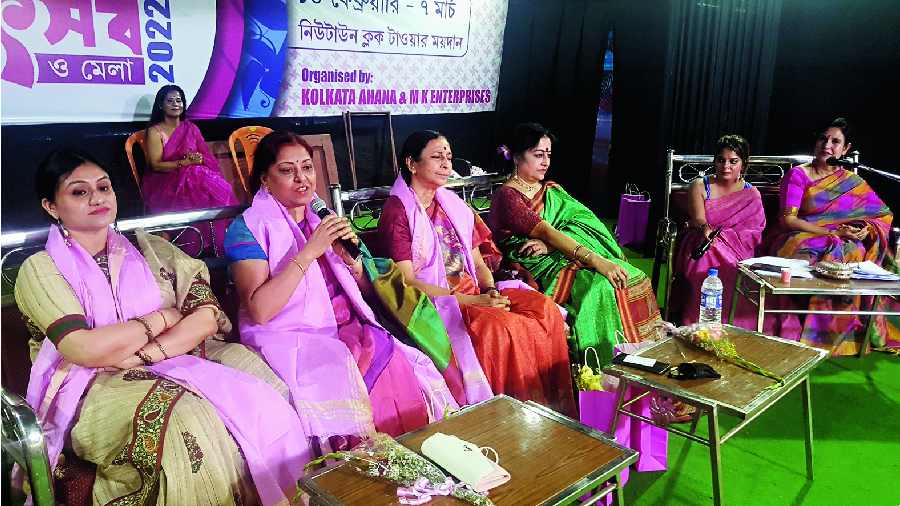Women need to love themselves. Only then will they feel the urge to take care of themselves, defend themselves and by extension, fight for those that they love,” said embryologist Ratna Chattopadhyay.
She was speaking at a panel discussion held to celebrate Women’s Day at New Town Utsab O Mela, at the clock tower grounds. The topic was on how women should love themselves.
“Society imposes certain responsibilities on women, thereby curbing their freedom of choice,” said
Debolina Roy, who was moderating the discussion. Debolina is president of Ahana, the cultural group that organised the fair along with MK Enterprises. “If a man knows how to cook he is appreciated but if a woman doesn’t know how to cook she is taunted. In such a world, isn’t it difficult for women to love themselves?”
Environmental scientist Swati Nandi Chakraborty said: “Everything one does should be with love, even if it is planting a tree. Only then will the effort be whole-hearted.”
Some speakers felt it was but natural for everyone to love themselves the most. “It satisfies the ego to even be speaking on a stage and have everyone listen to you,” said Indrani Bhattacharya, singer and television newscaster.
Rupa Roy, administrator of St Joseph & Mary’s School, agreed. “We all love ourselves and want to be the best. But let us do so not to boost our ego but to inspire others,” said the resident of Salt Lake’s DB Block.
The conversation gradually drifted to the state of women in the county and on how many of them can truly be called happy.
“Look at our domestic helps. In their society, it is not uncommon for men to take on mistresses after they have children from their wives. Burdened with troubles, these wives will certainly think twice before believing they love themselves,” said Bhattacharya, going on to emphasise the importance of women’s financial independence. “It’s not enough to be happy if one’s husband is earning well and giving one money.”
Nandi Chakraborty stressed on women’s education and recalled Swami Vivekananda’s thoughts on how a nation cannot progress if its women fall behind. “If you educate a woman you educate her whole family,” she said.
Rupa Roy was reminded of acrobatics at fairs. “Remember the little girl who does tightrope walks to entertain crowds at fairs? That’s the state of women in our country. She is expected to be perfect at home and office but how can she do so without support?” she asked.
“Our mothers devoted their lives to their families. They cooked, cleaned, stitched kathas, made boris and pickles for others... What would they do for themselves?” wondered Chattopadhyay. “If a man spends the day reading, he is considered a connoisseur but if a woman reads or sings the whole day she is termed selfish.”
The speakers noted that women were trying to be financially independent now but upon returning home from work, were still expected to complete chores.
“Women did the lion’s share of chores during the lockdown, isn’t it?” asked Nandi Chakraborty to nodding heads.
“The mindset needs to change, even that of women themselves,” said Bhattacharya. “If the husband so much as rises to keep the tea cup in the kitchen, there are women who stop them and take on the task themselves. During the lockdown if the husband asked if he should sweep the floor, there were woman who told them not to bother. They feel it looks strange if the man of the house does dishes, all the while trying to project themselves as saints. This isn’t the case in the West, where there is division of labour at home.”
At least a ray of hope was shown by Chattopadhyay, who shared her experience of working with IVF technology at the Institute of Reproductive Medicine in Salt Lake’s HB Block. “There was a time when would-be parents would plead with us to ensure they delivered sons and not daughters. I would ask the mothers why they were insistent when their daughters too could be brought up to be confident and independent individuals, but they would say they were being pressured by their families,” said Chattopadhyay. “Such requests have reduced drastically now.”
